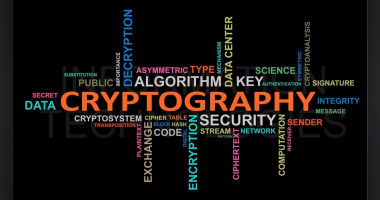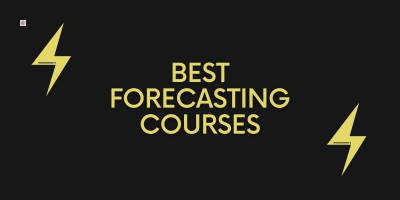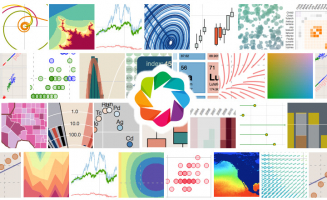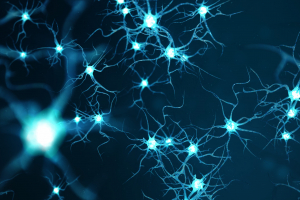Top 12 Best Online Approximation Courses
In science, approximation can refer to using a simpler process or model when the exact model is difficult to use. Approximate models are used for easier ... read more...calculations. Approximations can also be used if incomplete information prevents the use of exact representations. So here are the 12 Best Online Approximation Courses. Let's find out the courses with Toplist
-
It is one of the best online approximation courses for anyone interested in learning more about approximation. You will learn how to tackle issues involving vast, high-dimensional, and potentially infinite state spaces in this course. You'll show how estimating value functions may be modeled as a supervised learning problem (function approximation), allowing you to create agents that carefully balance generalization and discrimination to maximize reward. They will start by looking at how policy assessment and prediction approaches, such as Monte Carlo and TD, may be used to function approximation. You'll learn about representation learning using neural networks and backprop, as well as feature creation approaches for RL.
They wrap off this session with a look at policy gradient techniques, which are a means of learning policies without having to memorize a value function. In this course, you'll solve two continuous-state control problems and learn about the advantages of policy gradient approaches in a continuous-action setting. Prerequisites: This course expands on the basics learned in Courses 1 and 2, and students should have finished those courses before beginning this one. Probabilities and expectations, basic linear algebra, basic calculus, Python 3.0 (at least 1 year), and implementing algorithms from pseudocode should all be familiar to students.
You will be able to do the following by the conclusion of this course: Understand how to estimate value functions using supervised learning algorithms; Understand the prediction (value estimate) objectives in the context of function approximation; Execute TD in an environment with an unlimited state space using function approximation (state aggregation) (continuous state space); Know how to build features using fixed basis and neural networks; Implement TD in a continuous state environment using neural network function approximation -Understand new challenges in exploration when transitioning to function approximation; Apply anticipated Sarsa and Q-learning with function approximation on a continuous state control challenge -Understand objectives for directly estimating policies -Contrast discounted problem formulations for control against an average reward problem formulation (policy gradient objectives); In a discrete state context, implement a policy gradient approach (dubbed Actor-Critic).
- Flexible deadlines: Reset deadlines based on your availability.
- Shareable certificate: Get a Certificate when you complete
- 100% online: Start now and learn at times that suit you.
- Course 3 of 4 in the: Reinforcement Learning Specialization
- Intermediate level: Probabilities & Expectations, basic linear algebra, basic calculus, Python 3.0 (at least 1 year), implementing algorithms from pseudocode.
- Approx. 10 p.m. to finish
- Subtitles: Arabic, French, Portuguese (European), Italian, Vietnamese, German, Russian, English, Spanish
SKILLS YOU WILL GAIN:
- Artificial Intelligence (AI)
- Machine-learning
- Reinforcement Learning
- Function Approximation
- Intelligent Systems
Rating: 4.8/5
Enroll here: coursera.org/learn/prediction-control-function-approximation
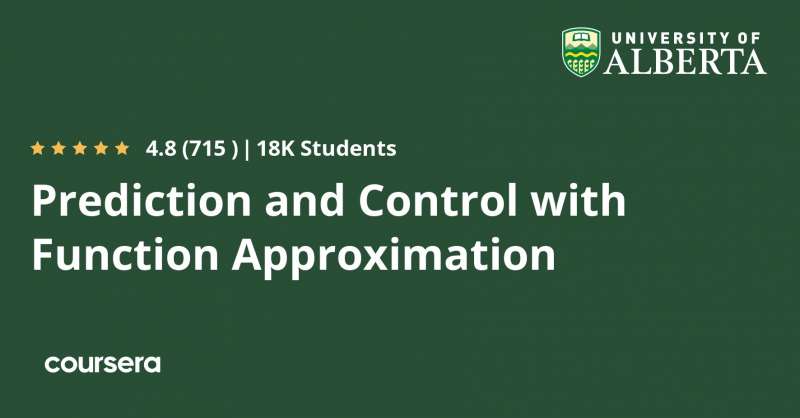
coursera.org -
Part 2 of the approximation algorithms
This is a continuation of Part 1 of Approximation Algorithms. You'll learn how to use linear programming duality to the design of several approximation algorithms, as well as semidefinite programming to Maxcut. You will be introduced to a variety of issues at the foundations of theoretical computer science, as well as sophisticated design and analytic tools, by studying both portions of this course.
When presented with a novel combinatorial optimization issue, you will be able to detect whether it is similar to one of a few known fundamental problems, and you will be able to create linear programming relaxations and utilize randomized rounding to try to solve your own problem. The material of the course, particularly the homework, is theoretical in nature, with no programming tasks. This is the second half of a two-part Approximation Algorithms course.
- Flexible deadlines: Reset deadlines based on your availability.
- 100% online: Start now and learn at times that suit you.
- Approx. 33 hours to complete
- Subtitles: French, Portuguese (European), Russian, English, Spanish
Rating: 4.8/5
Enroll here: coursera.org/learn/approximation-algorithms-part-2
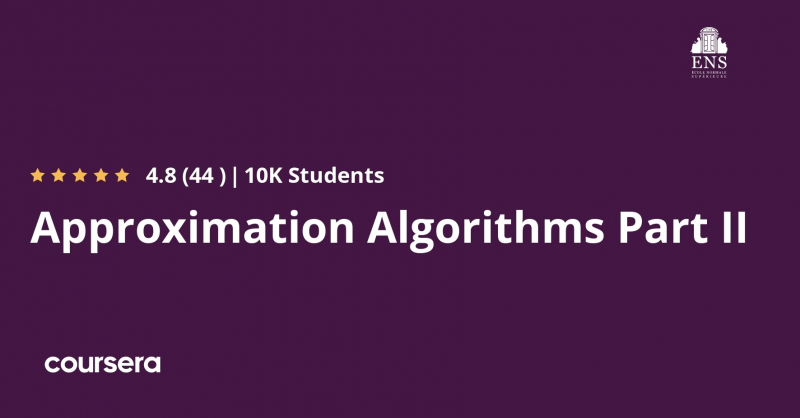
coursera.org 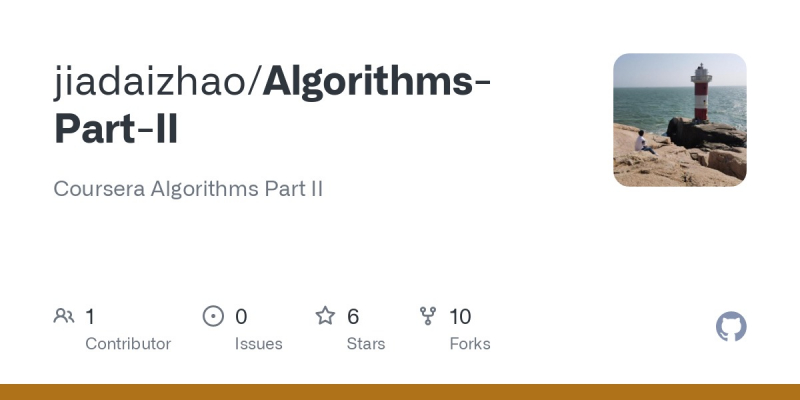
github.com -
This specialty introduces subjects in single and multivariable calculus, with an emphasis on applying calculus to natural and social science problems. Students will learn to process, analyze, and evaluate data utilizing calculus tools, as well as convey relevant conclusions using scientific computing and mathematical modeling. Functions as data models, differential and integral calculus of functions of one and more variables, differential equations, and optimization and estimation techniques are among the topics covered.
This specialization covers subjects in single and multivariable calculus, with an emphasis on applying calculus to natural and social science problems. Students will learn how to utilize scientific computers and mathematical modeling to process, analyze, and understand data, as well as convey relevant conclusions, utilizing calculus tools. Differential and integral calculus of functions of one or more variables, differential equations, and optimization and estimation techniques are some of the topics covered.
- Shareable certificate: Get a Certificate when you complete
- 100% online courses: Start now and learn at times that suit you.
- Flexible schedule: Set and stick to flexible deadlines.
- Intermediate level: Students should have a working knowledge of precalculus before starting this course.
- Approximately 6 months to complete
- Recommended pace of 2 hours/week
- Subtitles: English
SKILLS YOU WILL GAIN
- Function analysis
- Mathematical Optimization
- Vectors
- Data Analysis
- Modeling
WHAT YOU WILL LEARN
- Model data with both single and multivariable functions
- Find maximum and minimum values of both single and multivariable functions, with and without constraints, to find optimal solutions to problems.
- Understand properties of different types of functions to apply them accordingly to model different situations.
- Perform operations of differential calculus, such as finding velocity, acceleration, rates of change, and slopes of tangent lines.
Rating: 4.8/5
Enroll here: coursera.org/specializations/differential-calculus-data-modeling

coursera.org 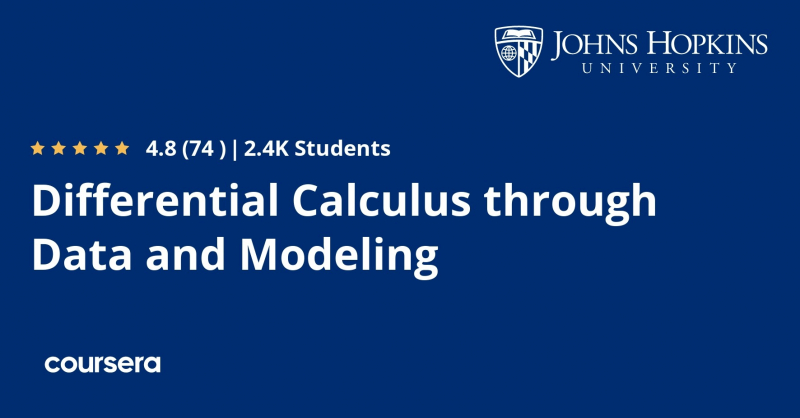
coursera.org -
Calculus is one of humanity's greatest achievements, describing everything from planetary orbits to the ideal size of a metropolis to the regularity of a pulse. This concise course introduces the fundamental concepts of single-variable calculus, with an emphasis on conceptual comprehension and applications. The course is designed for students who are new to engineering, physical science, or social science.
The Calculus: Single Variable Part 2 - Differentiation includes several distinguishing aspects, including: an early introduction and application of Taylor series and approximations; a novel synthesis of discrete and continuous forms of Calculus; an emphasis on the conceptual over the computational; a clear, dynamic, and cohesive approach.They will go through derivatives, differentiation rules, linearization, higher derivatives, optimization, differentials, and differentiation operators in this second of five parts.
- Flexible deadlines: Reset deadlines based on your availability.
- 100% online: Start now and learn at times that suit you.
- Approx. 10 hours to complete
- Subtitles: French, Portuguese (European), Chinese (simplified), Russian, English, Spanish
SKILLS YOU WILL GAIN
- Differential (Mathematics)
- Newton'S Method
- Linear Approximation
- Differential Calculus
- Derivative
Rating: 4.8/5
Enroll here: coursera.org/learn/differentiation-calculus
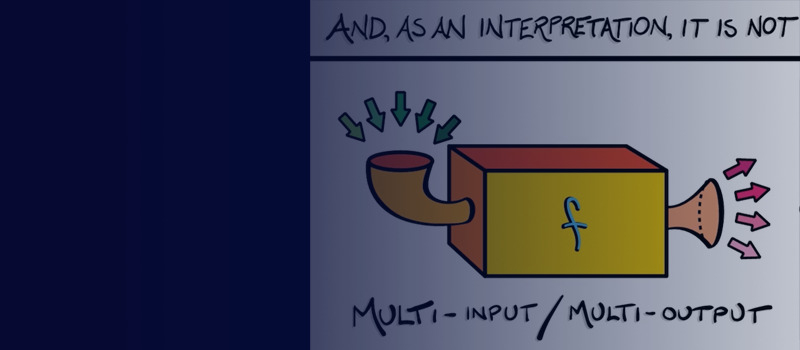
platform.onlinelearning.upenn.edu 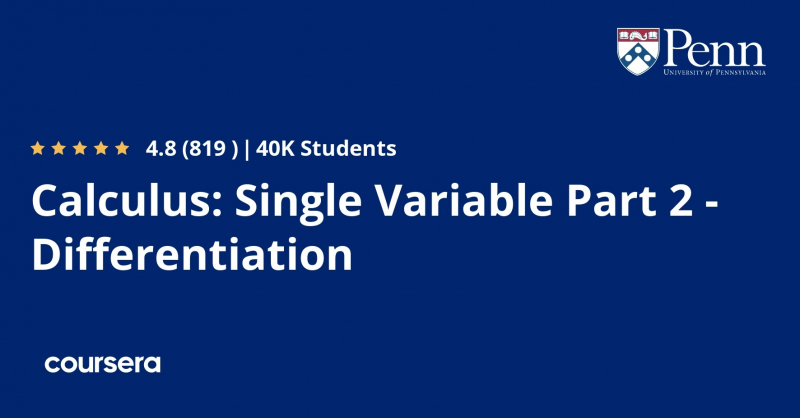
coursera.org -
Calculus is one of humanity's greatest achievements, describing everything from planetary orbits to the ideal size of a metropolis to the regularity of a pulse. This concise course introduces the fundamental concepts of single-variable calculus, with an emphasis on conceptual comprehension and applications. The Calculus: Single Variable Part 3 - Integration, one of the best online approximation courses, is designed for students who are new to engineering, physical science, or social science.
The course includes several distinguishing aspects, including: an early introduction and application of Taylor series and approximations; a novel synthesis of discrete and continuous forms of Calculus; an emphasis on the conceptual over the computational; and a clear, dynamic, and cohesive approach. They will look at integrating differential equations, integration techniques, the fundamental theorem of integral calculus, and challenging integrals in this third of five parts.
- Flexible deadlines: Reset deadlines based on your availability.
- 100% online: Start now and learn at times that suit you.
- Approx. 5 p.m. to finish
- Subtitles: French, Portuguese (European), Russian, English, Spanish
SKILLS YOU WILL GAIN
- Differential Equations
- Integration By Parts
- Improper Integral
- Integration By Substitution
Rating: 4.8/5
Enroll here: coursera.org/learn/integration-calculus
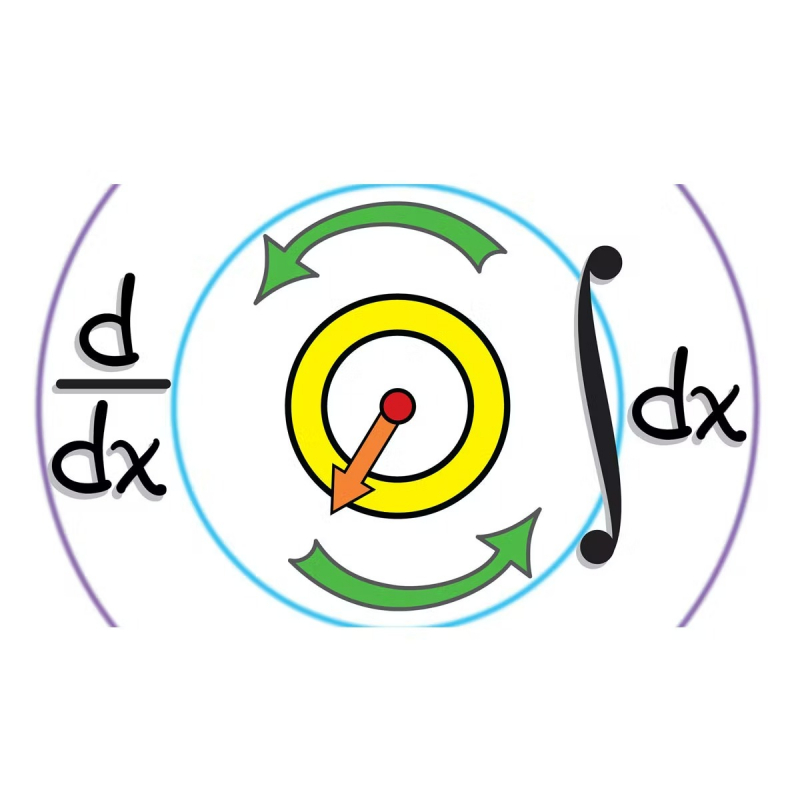
coursera.org 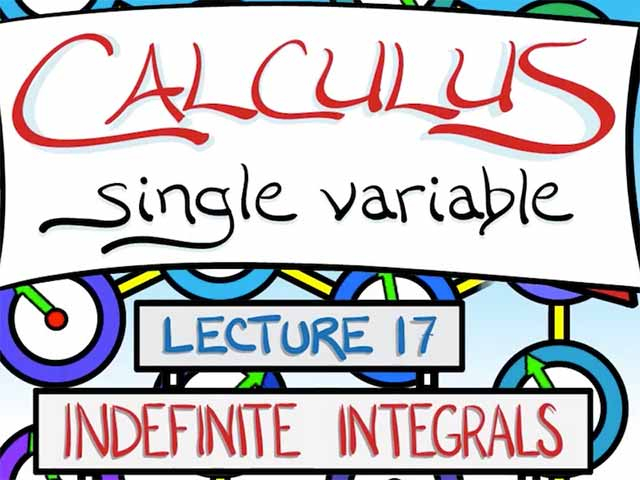
platform.onlinelearning.upenn.edu -
Calculus is one of humanity's greatest achievements, describing everything from planetary orbits to the ideal size of a metropolis to the regularity of a pulse. This concise course introduces the fundamental concepts of single-variable calculus, with an emphasis on conceptual comprehension and applications. The Calculus: Single Variable Part 1 - Functions is designed for students who are new to engineering, physical science, or social science.
The course includes several distinguishing aspects, including: an early introduction and application of Taylor series and approximations; a novel synthesis of discrete and continuous forms of Calculus; an emphasis on the conceptual over the computational; a clear, dynamic, and cohesive approach. In this first of five parts, you'll learn more about Taylor series, review limits, comprehend the *why* behind l'Hopital's rule, and, most crucially, acquire a new language for representing function development and decay: the BIG O.
- Flexible deadlines: Reset deadlines based on your availability.
- 100% online: Start now and learn at times that suit you.
- Approx. 2 p.m. to complete
- Subtitles: Arabic, French, Portuguese (European), Chinese (Simplified), Italian, Vietnamese, German, Russian, English, Spanish
SKILLS YOU WILL GAIN
- Series Expansions
- Calculus
- Series Expansion
Rating: 4.7/5
Enroll here: coursera.org/learn/single-variable-calculus
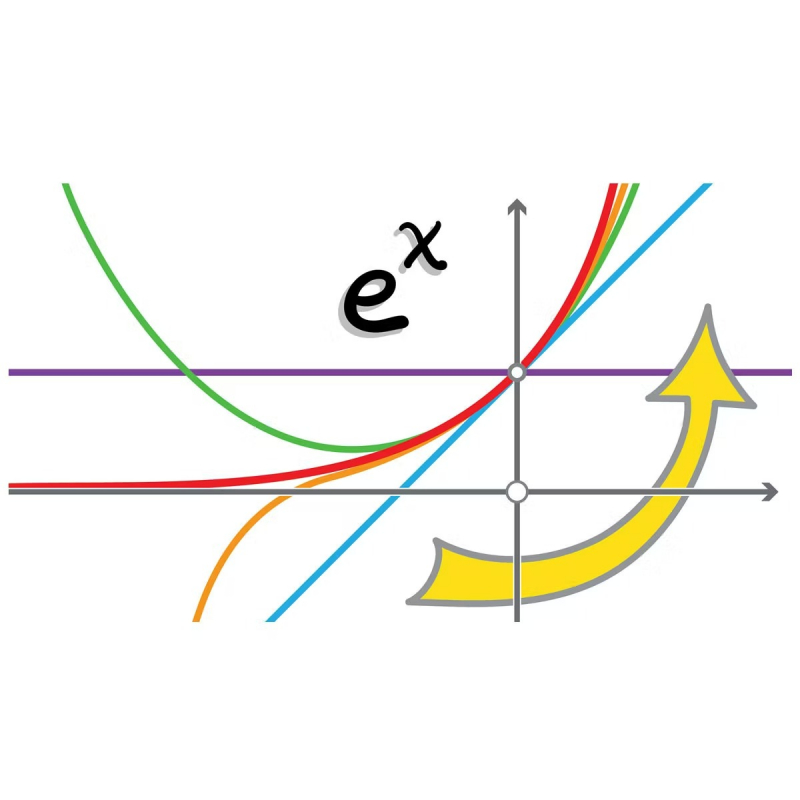
coursera.org 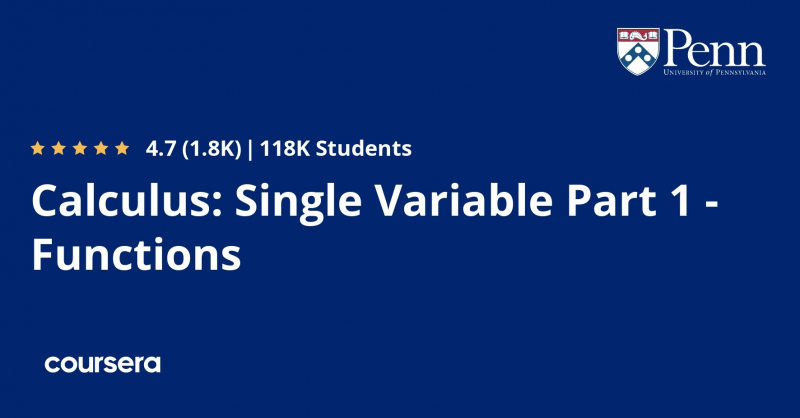
coursera.org -
You will use your expertise from Courses 1, 2, and 3 to construct a comprehensive RL solution to a problem in this last course. This capstone will show you how each component—-problem formulation, algorithm selection, parameter selection, and representation design—-combines to build a full solution, as well as how to make proper decisions while using RL in the real world. This project will need you to create both a stimulating environment and a control agent that approximates Neural Network functions. You will also perform a scientific analysis of your learning system in order to improve your capacity to evaluate the robustness of RL agents.
To utilize RL in the real world, you must properly formulate the issue as an MDP, pick appropriate algorithms, determine which implementation decisions will have a significant influence on performance, and evaluate your algorithms' predicted behavior. This capstone is essential for anybody who intends to use RL to tackle real-world challenges. You must have completed or equivalent to Courses 1, 2, and 3 in this Specialization to be successful in this course.
You will be able to do the following by the conclusion of this course: Complete an RL solution to an issue, beginning with the formulation of the problem, proper algorithm selection and implementation, and an empirical examination of the solution's efficacy.- Flexible deadlines: Reset deadlines based on your availability.
- Shareable certificate: Get a Certificate when you complete
- 100% online: Start now and learn at times that suit you.
- Course 4 of 4 in the: Reinforcement Learning Specialization
- Intermediate level: Probabilities & Expectations, basic linear algebra, basic calculus, Python 3.0 (at least 1 year), implementing algorithms from pseudocode.
- Approx. 4 p.m. to complete
- Subtitles: Arabic, French, Portuguese (European), Italian, Vietnamese, German, Russian, English, Spanish
SKILLS YOU WILL GAIN
- Artificial Intelligence (AI)
- Machine-learning
- Reinforcement Learning
- Function Approximation
- Intelligent Systems
Rating: 4.7/5
Enroll here: coursera.org/learn/complete-reinforcement-learning-system
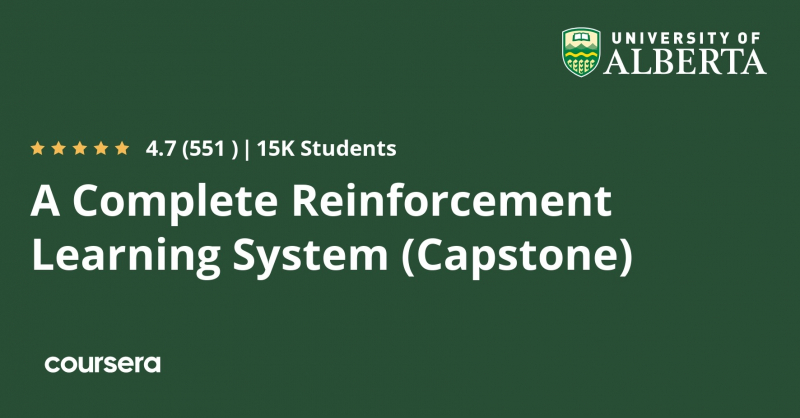
coursera.org -
This course provides a basic understanding of multivariate calculus, which is essential to construct several standard machine learning approaches. They will start at the beginning with a review of the "rise over run" formulation of a slope before moving on to the formal definition of a function's gradient. Then they begin to put together a collection of tools that make calculus easier and faster. Next, they will learn how to compute vectors that point upwards on multidimensional surfaces, and they will use an interactive game to put what they have learned into practice.
They will look at how calculus may be used to create approximations to functions, as well as quantifying how precise such approximations should be. They also spend some time discussing where calculus is used in neural network training before showing you how it is used in linear regression models. The Multivariate Calculus is designed to provide you a basic grasp of calculus as well as the vocabulary you'll need to hunt up ideas on your own if you get stuck. Without getting into too much depth, maybe you'll have enough confidence to take some more specialized machine learning classes in the future.
- Flexible deadlines: Reset deadlines based on your availability.
- Shareable certificate: Get a Certificate when you complete
- 100% online: Start now and learn at times that suit you.
- Course 2 of 3 in the: Mathematics for Machine Learning Specialization
- Beginner level
- Approx. 6 p.m. to finish
- Subtitles: Arabic, French, Portuguese (European), Greek, Italian, Vietnamese, German, Russian, English, Spanish
SKILLS YOU WILL GAIN
- Linear Regression
- Vector Calculus
- Multivariate Calculus
- Gradient Down
Rating: 4.7/5
Enroll here: coursera.org/learn/multivariate-calculus-machine-learning
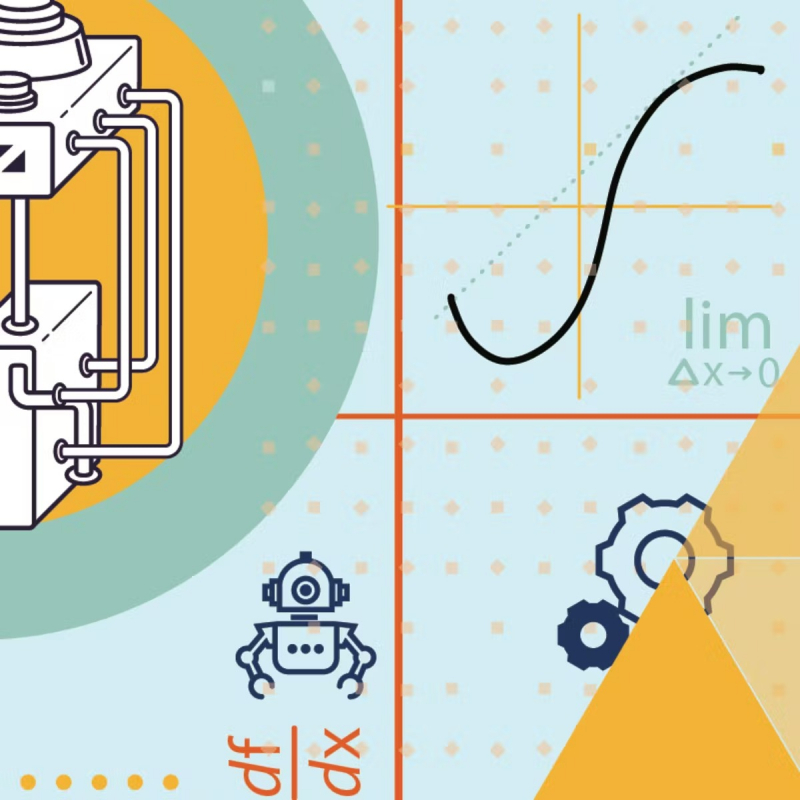
coursera.org 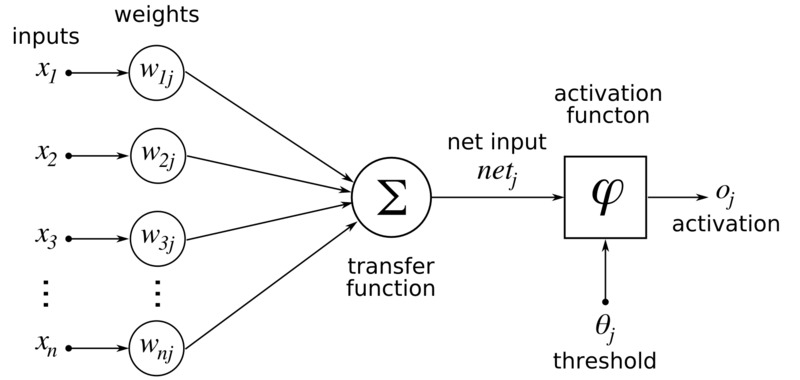
mlq.ai -
Part I of the approximation algorithms
How well can you pack items into the fewest possible boxes? How well can nodes be clustered so that a network may be divided into components around a few centers at a low cost? These are instances of combinatorial optimization tasks that are NP-hard. Because solving such problems efficiently is likely unachievable, goal is to provide an approximation solution that can be computed in polynomial time while still having verifiable assurances on its cost compared to the optimum. This course presupposes knowledge of a regular undergraduate Algorithms course and focuses on designing algorithms using linear programming, a popular and incredibly effective method in this field.
You will be introduced to a variety of issues at the foundations of theoretical computer science, as well as sophisticated design and analytic tools, by taking this course. When presented with a novel combinatorial optimization issue, you will be able to detect whether it is similar to one of a few known fundamental problems, and you will be able to create linear programming relaxations and utilize randomized rounding to try to solve your own problem. The material of the course, particularly the homework, is theoretical in nature, with no programming tasks. Approximation Algorithms is the first of a two-part course.
- Flexible deadlines: Reset deadlines based on your availability.
- 100% online: Start now and learn at times that suit you.
- Approx. 36 hours to complete
- Subtitles: French, Portuguese (European), Russian, English, Spanish
Rating: 4.7/5
Enroll here: coursera.org/learn/approximation-algorithms-part-1
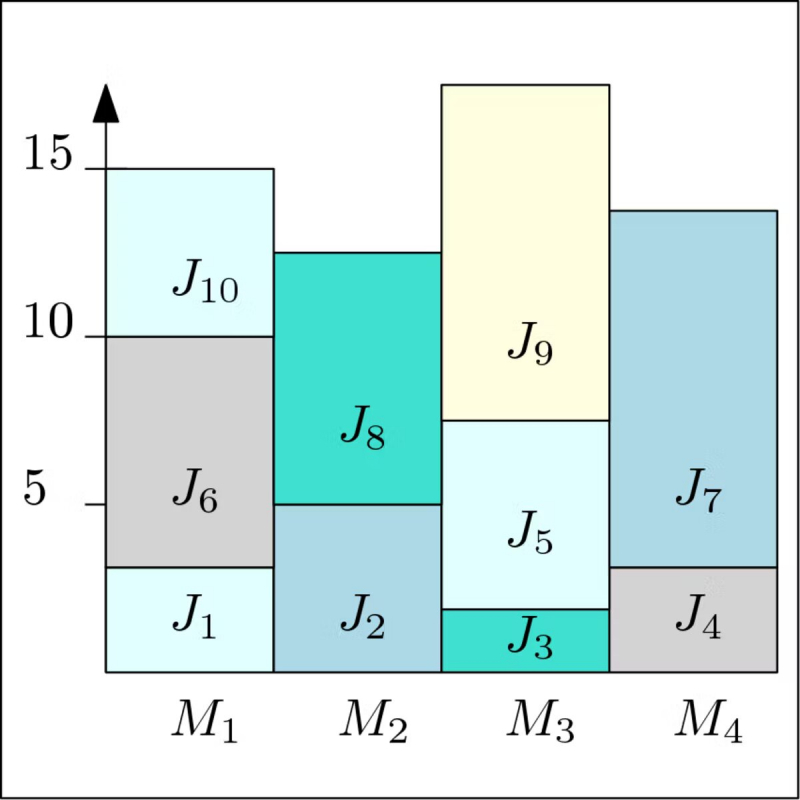
coursera.org -
Many real-world algorithmic issues, for example, are NP-hard and cannot be addressed effectively using typical algorithmic methods. The purpose of the Approximation Algorithms is to familiarize students with key algorithmic principles and approaches that are required to properly solve such issues. These strategies are useful when they don't need the exact answer to a problem, but rather an estimate that is near to it. They will look at how to find such approximations quickly. Prerequisites: You need have a basic understanding of algorithms and mathematics in order to succeed in this course.
Here's a quick rundown of what you should know: O-notation, -notation, -notation; algorithm analysis; Fundamental calculus: handling summations, solving recurrences, and working with logarithms, among other things; Probability theory fundamentals: occurrences, probability distributions, random variables, expected values, and so on; Linked lists, stacks, queues, and heaps are examples of basic data structures; Binary search trees (balanced); Basic graph concepts, representations of graphs (adjacency lists and adjacency matrices), and basic graph algorithms (BFS, DFS, topological sort, shortest routes).
The Approximation Algorithms materials are based on the course notes, which may be accessed under the resources page. They will not go over all of the material in the course notes. The course notes are available for students who did not fully comprehend the lectures as well as those who want to learn more about the topics. There are a few small errors in the video lectures. A list of these blunders may be found in the resources section (in the document called "Errata"). If you believe you have discovered a mistake, please report it by clicking the square flag at the bottom of the lecture or quiz where the error was discovered.
- Flexible deadlines: Reset deadlines based on your availability.
- Shareable certificate: Get a Certificate when you complete
- 100% online: Start now and learn at times that suit you.
- Intermediate level
- Approx. 3 p.m. to complete
- Subtitles: English
Rating: 4.7/5
Enroll here: coursera.org/learn/approximation-algorithms
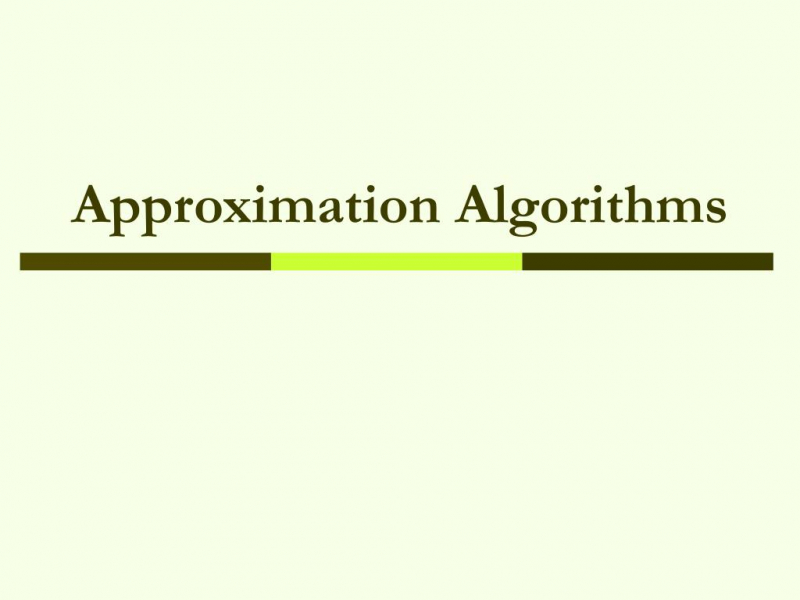
slideserve.com -
PGMs (probabilistic graphical models), one of the best online Approximation courses, are a powerful tool for storing probability distributions in complicated domains, such as joint (multivariate) distributions with several random variables that interact with one another. These representations are based on notions from probability theory, graph algorithms, machine learning, and more, and they lie at the crossroads of statistics and computer science. They serve as the foundation for cutting-edge technologies in a wide range of fields, including medical diagnosis, picture interpretation, speech recognition, natural language processing, and so on. They're also a key component in the formulation of many machine-learning issues.
This is the second of three courses in a series. Following on from the first course's focus on representation, this one looks at probabilistic inference and how a PGM may be used to answer questions. A PGM's structure is designed to allow questions to be answered efficiently, despite the fact that it typically depicts a very high dimensional distribution. The course covers both precise and approximation techniques for various sorts of inference tasks, as well as when and how each should be used. Two hands-on programming projects are included in the (highly recommended) honors track, in which core routines of the most often used exact and approximation algorithms are constructed and applied to a real-world situation.
- Flexible deadlines: Reset deadlines based on your availability.
- Shareable certificate: Get a Certificate when you complete
- 100% online: Start now and learn at times that suit you.
- Course 2 of 3 in the: Specialization Probabilistic graphical models
- Advanced level
- Approx. 38 hours to complete
- Subtitles: French, Portuguese (European), Russian, English, Spanish
SKILLS YOU WILL GAIN
- Inference
- Gibbs Sampling
- Markov Chain Monte Carlo (MCMC)
- Belief Spread
Rating: 4.6/5
Enroll here: coursera.org/learn/probabilistic-graphical-models-2-inference
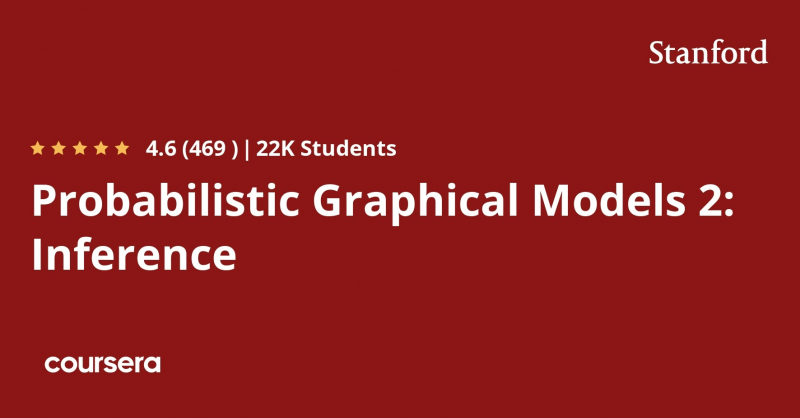
coursera.org -
Calculus is one of humanity's greatest achievements, describing everything from planetary orbits to the ideal size of a metropolis to the regularity of a pulse. This concise course introduces the fundamental concepts of single-variable calculus, with an emphasis on conceptual comprehension and applications. The course is designed for students who are new to engineering, physical science, or social science. The course includes several distinguishing aspects, including: an early introduction and application of Taylor series and approximations; a novel synthesis of discrete and continuous forms of Calculus; an emphasis on the conceptual over the computational; a clear, dynamic, and cohesive approach.
They cover a calculus for sequences, numerical techniques, series and convergence tests, power and Taylor series, and complete the course with a final exam in this fifth part (part five of five). By enrolling in Coursera's verified certificate program and completing the series' final exam, students in this course can receive a certificate in the series.
- Flexible deadlines: Reset deadlines based on your availability.
- Shareable certificate: Get a Certificate when you complete
- 100% online: Start now and learn at times that suit you.
- Approx. 2 p.m. to complete
- Subtitles: French, Portuguese (European), Russian, English, Spanish
Rating: 4.6/5
Enroll here: coursera.org/learn/discrete-calculus
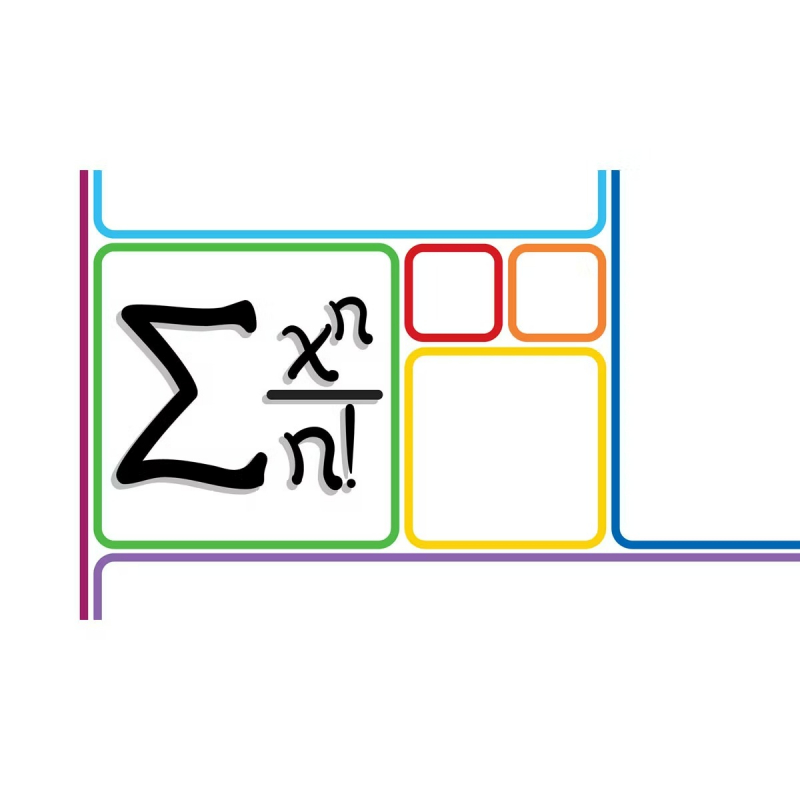
coursera.org

















